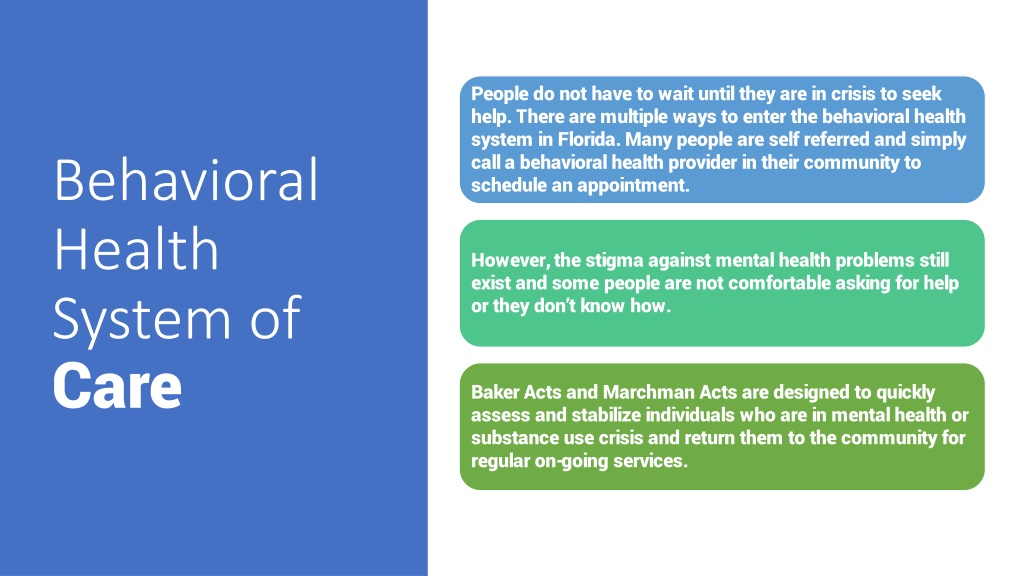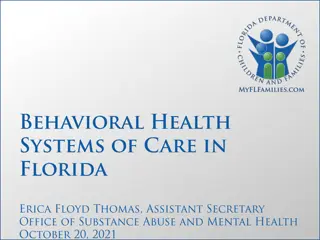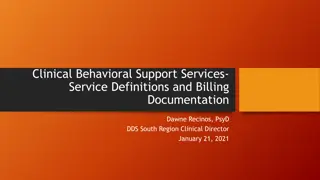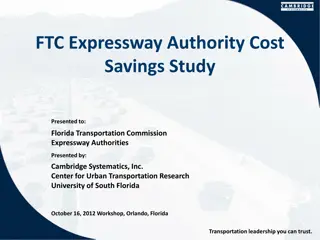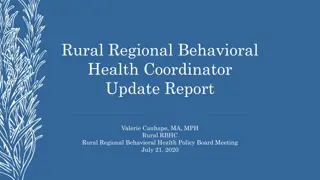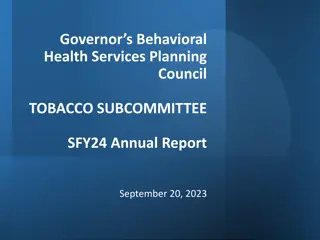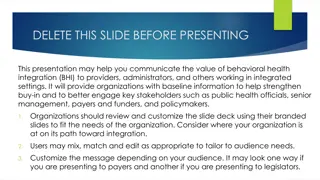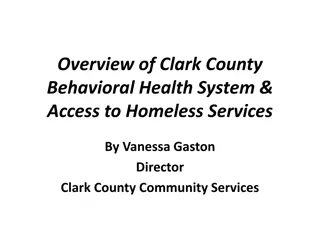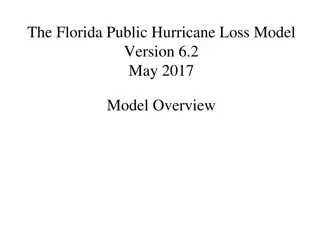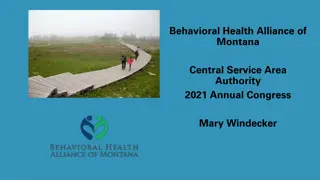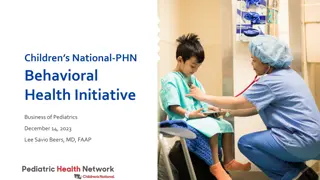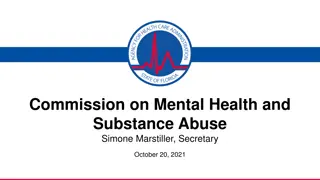Behavioral Health System in Florida: Access and Support Overview
Florida's behavioral health system offers multiple ways for individuals to seek help, whether through self-referral or crisis intervention programs like the Baker Act and Marchman Act. Services range from adult mental health treatment facilities to children's mental health promotion programs. Departments play a key role in establishing standards and maintaining data on involuntary examinations. The Baker Act helps balance individual liberty with safety concerns, allowing individuals to receive voluntary treatment with the option for follow-up care.
Download Presentation

Please find below an Image/Link to download the presentation.
The content on the website is provided AS IS for your information and personal use only. It may not be sold, licensed, or shared on other websites without obtaining consent from the author. Download presentation by click this link. If you encounter any issues during the download, it is possible that the publisher has removed the file from their server.
E N D
Presentation Transcript
People do not have to wait until they are in crisis to seek help. There are multiple ways to enter the behavioral health system in Florida. Many people are self referred and simply call a behavioral health provider in their community to schedule an appointment. Behavioral Health System of Care However, the stigma against mental health problems still exist and some people are not comfortable asking for help or they don t know how. Baker Acts and Marchman Acts are designed to quickly assess and stabilize individuals who are in mental health or substance use crisis and return them to the community for regular on-going services.
SAMH Services Array Adult Mental Health State Treatment Facility CSU/SRT/ Inpatient Health Promotion In-Home / On-Site Outpatient FACT Residential Adult Substance Abuse Recovery Support ARF Intensive Outpatient Prevention Outpatient Residential Detoxification Children s Mental Health Health Promotion / Early Intervention Therapeutic Group / Foster Home Residential Treatment (SIPP) CSU / Inpatient In-Home / On- Site Outpatient CAT Children s Substance Abuse Intensive Outpatient Community Support Juvenile ARF Prevention Outpatient Residential Detoxification
Departments Role Publish and distribute an information handbook Adopt rules: Establish forms and procedures relating to the rights and privileges of individuals served Establish minimum standards for services provided by a mental health overlay program or a mobile crisis response services Designate receiving facilities and treatment facilities Receive and maintain copies of Baker Act initiation forms to be used to prepare an annual report analyzing the data for the Legislature Analyze data of involuntary examination of children and students who are removed from a school; identify trends and cases of repeated initiations on the same child or student; study root causes and submit a report on findings and recommendation to the Governor and Legislature each off numbered year.
Baker Act Overview Balances liberty interests against safety of individual and society. The Baker Act and Marchman Act are the only ways an individual can be held without being arrested for a crime. Typically, treatment must be voluntary, unless certain circumstances exist Follow up after a Baker Act or Marchman Act is also voluntary, also unless there is a court order for treatment
5 Baker Act Overview Who may initiate crisis admission? Law enforcement officer, licensed clinical practitioner, or court. Designated law enforcement must transport examinees unless county-approved transportation plans permits EMS or MRT Teams. Transportation for involuntary examination Crisis Stabilization Units and Inpatient Psychiatric Hospitals designated by DCF as receiving facilities. Baker Act Facilities Except for a serious medical condition, receiving facilities must accept individuals for examination. Requirement to accept for crisis assessment/examination Maximum initial period of examination/ assessment Up to 72 hours (for minors, exam must begin within 12 hours of arrival). Must be discharged as soon the patient does not meet the criteria. (This may be sooner than 72 hours.) If the patient meets criteria beyond 72 hours a petition must be filed for continued treatment. Discharge planning
6 Discharge Planning If the individual is a minor, information regarding the availability of community supports is provided to the patient s guardian or representative Care Coordination may be provided (optional) Patient participation (optional) Notification of the right to receive follow up care is provided If the individual is a minor, notification of release must be given to patient s guardian
7 Baker Act Examinations by Initiating Professional 202,598 examinations 52% 46% 2% Law Enforcement Professional Certificate Court Order 66% - Physicians 11.5% - Licensed Mental Health Counselor 9.5% Psychiatrist 6% - Licensed Clinical Social Worker 2% - Psychiatric Nurse 1.5% Psychologist 1.5% Physician Assistant
8 Involuntary Examinations by Age Group In SFY 2019-2020 there were a total of 202,598 involuntary examinations. A decrease of 3.98% (210,992) from SFY 2018-2019. 7.30% Older Adults 65+ 73.80% Adults 18 - 64 17.74% Children <18
9 Repeated Involuntary Examinations Of the 128,193 people with involuntary exams during the year, approximately experienced more than one exam during the year. 25.42% All Ages 23.97% Children <18 25.97% Adults 18 - 64
10 Key Marchman Act Features Law enforcement officer, licensed clinical practitioner, master s level certified addictions professional for substance abuse services, or court. Who may initiate crisis admission? Designated law enforcement must transport examinees unless county-approved transportation plans permits EMS or an alternative vendor. Individuals under voluntary status may be transported by a friend, family or themselves. Transportation for involuntary examination Medical hospital licensed by AHCA, Addictions Receiving Facilities, or Detoxification Units licensed by DCF. Marchman Act Facilities Requirement to accept for crisis assessment/examination When no bed is available at an Addictions Receiving Facility individuals may be transported to a medical hospital, jail or home. Maximum initial period of examination/ assessment Up to 5 days (for minors, exam must begin within 12 hours of arrival). Providers can petition the court for an additional 7 days to complete the assessment and stabilization. Disposition must be as follows: Discharge with appropriate referral to another treatment facility or service provider, or community services; Voluntarily treatment; or Involuntary treatment when authorized by the court. Discharge planning
11 Unique Features of the Marchman Act Includes five procedures to obtain involuntary substance abuse assessment, stabilization and treatment. Protective custody Emergency admission Alternative assessment for minors Applications can be filed by parent, legal guardian Must be assessed within 72 hours of admission Can be retained for total of 5 days based on physician s determination services are needed. Involuntary assessment and stabilization Involuntary treatment The court may order individuals that meet the criteria for involuntary treatment to into treatment for up to 90 days and can extend an additional 90 days under certain circumstances.
12 Marchman Act Data In SFY 2019-2020 there were a total of 9,268* court orders for Marchman Act. 3,914 Dismissed before hearing 5,287 Dismissed by judge 92 Disposed by non-jury trial *Source: Office of State Court Administrator
Training Training is one of the responsibilities of the office and is frequently requested by providers and system partners. Training has been made available through our workforce development contract with the Florida Certification Board. This is a free, online option for training for anyone who is interested. Training can be completed at any time, started and stopped as convenient for the user. There are a variety of course topics to choose from including Introduction to Baker Act Marchman Act Basics Law Enforcement and the Baker Act Law Enforcement and the Baker Act- Refresher Minors and the Baker Act Emergency Medical Treatment: Baker Act and Marchman Act Marchman Act Basic- Refresher Guardian Advocate and the Marchman Act Guardian Advocate and the Baker Act
Other Resources Baker Act Manual Baker Act Frequently Asked Questions Marchman Act User Reference Guide Forms Annual Reports
